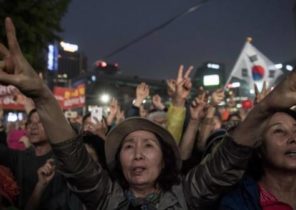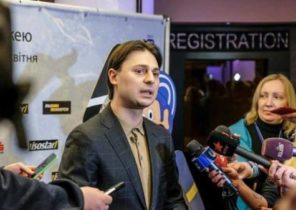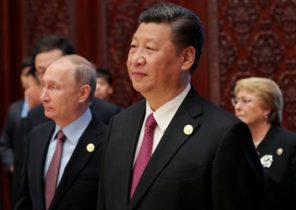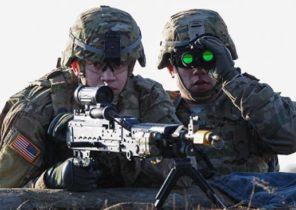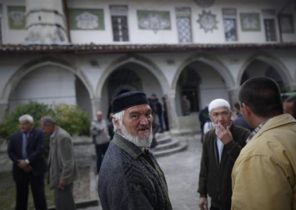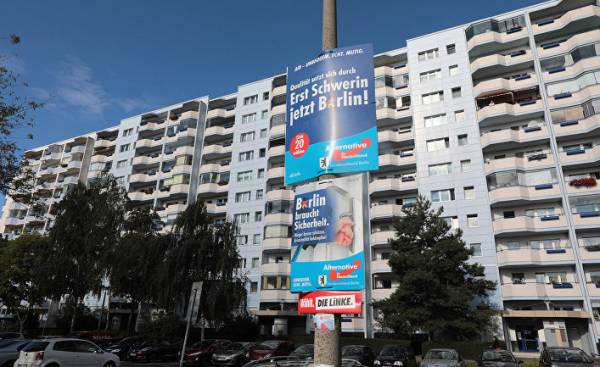
The story begins in one place, which is associated with memories of another bad history. Here, in front of Eastgate shopping centre in the Berlin district Marzahn, 16 January 2016 the woman told the angry crowd of 13-year-old girl, Russian German girl, raped by three of the refugees. After about a year and a half 27-year-old Dmitry Hajdel (Dmitri Geidel) quick strides out of the same shopping center and across the yard, into the neighborhood of the city, where he is fighting for a direct mandate in the Bundestag for the SPD (SPD).
Lisa, which got its start in Marzahn, in the meantime cleared up. A girl of Russian origin came up about the rape, the fear of strict parents. Despite this, this story is relevant to the history of Dmitry Gidala. Because it has become political. The Russian media have accused the German government of concealing the crime, many thousands of Russian Germans and right-wing politicians in the German cities were demonstrations against the policies of German Chancellor Angela Merkel in relation to refugees, has even been joined by Russian Minister of foreign Affairs.
The German party felt some fear: Russian Germans allow the right to govern themselves? At ADH, for example, there is a network that directly refers to them: “the Russian Germans and immigrants in ADG”. It would come to the stereotype. Therefore, in the Soviet years were people whose ancestors hundreds of years ago, left Germany, somewhere in Siberia or Kazakhstan, and sang German folk songs that, after the collapse of the system a joy to go to the old homeland. Where they were stunned by the reality, equality, tolerance, and Patriotic spirit.
Russian Germans is hard to achieve for the policy
Is this true? Dmitry Hajdel — one who can answer this question, for this reason, his party nominated him in Marzahn, where live about 30 thousand Russian Germans. Hajdel was born in 1989 in Leningrad, his father is German and mother is Russian, an infant he moved to Berlin. Since he lives in the district of Marzahn-Hellersdorf. Many friends of his father — the Russian Germans and other ethnic German repatriates from the former Soviet republics. In the whole of Germany with a total population of 4.5 million recent immigrants, including about two million of them — the Russian Germans.
He says that these people are different from stereotypes about the Russian Germans. “Old Russian Germans, there are common prejudices that they are against refugees and gay, watch only Russian TV and so vote for ADH — says Hajdel during a walk from Eastgate past the old exhibition center of the GDR Freizeitforum to the Russian Orthodox Church. But it is only a small part of the Russian Germans”.
He says that studies also confirmed that older Russian Germans lean toward the CDU and CSU. The younger generation is not distinguished from the Germans without migrant past. Among the Russian Germans party ADH is particularly strong in regions with poor economic prospects, exactly the same as among people without a migrant past.
So, for other parties with the Russian Germans of absolutely no problems? But it’s not, otherwise I would Hajdel for weeks instead of calling in the doors of houses, visited the Russian community, he wouldn’t have to smile, to talk, to listen, to ask.
Invisible migrants
“It is true that the Russian Germans are very difficult to reach for the German policy.” They are almost not interested in parties and disproportionately do not go to the polls. In this ADH see the greatest potential. Why is this happening? “The fact that Russian Germans do not openly protect their interests, among the older generation is still partly due to socialization in the Soviet Union. When politics did not interfere.” He also thinks that many Russian Germans after arrival in Germany did not want to attract attention: “They wanted to become invisible in society.”
Sorry about that other Dimitri in another district of Berlin. In a café in Prenzlauer Berg sits 31-year-old Dimitri Saad (Dimitrij Schaad), his father — Russian German — Russian mother, dark hair, blue eyes, he’s an actor in the Berlin theatre named after Maxim Gorky. He was born in 1985, not far from Alma-ATA in Kazakhstan and at the age of eight years moved with his parents and younger brother in Germany.
“Every time I walk past a kebab shop stalls and see how the Turks sit there and drink tea, it makes me jealous, he says. — The Turks have made one of his dishes in the national dish of Germany. And they have places where they can gather with their community and everyone can see them”. It’s the opposite of “invisible”, because they are already on the phenotype would be more difficult to hide than the mostly white-faced Russian Germans, recognizes Said.
As an actor he particularly regrets one thing: “it is unfortunate that the Russian Germans failed to produce successful professionals in the field of culture with our experience. How willingly I would look at a film like “Almaniya — welcome to Germany” (“Almanya — Willkommen in Deutschland”), shot from our point of view.” Everyone knows Fatih akin (Fatih Akin) or humorous programs like “Was guckst Du?”, in which the Turks are asking questions and making fun of their own community and German society. Jokes about the Russian Germans and their attitude to the Germans the average viewer would be, perhaps, confusing, because it is insufficiently aware of the peculiarities of Russian Germans to find them funny.
Dimitri Said trying to change it. For example, using the set Aalam by Ronen (Yael Ronen) of the play “the Situation” (“The Situation”). It Said plays a German teacher Stefan, who teaches the group of immigrants from the Middle East. As it turns out in the course of the play, Stefan actually came to light under the name “Sergei”. In Kazakhstan, as Dimitri Said, who himself wrote a monologue for this Stefan-Sergei. It goes something like this:
“It happened once in one country, which was “definitely not perfect, but stable and good place to live”: there lived a family, very similar to family Saada. With a father who was “passionately of the corrupt, socialist thieving head of the state warehouse building materials”. The family lived there happily. While this flawed country has not collapsed, and not chaos erupted on the streets dominated by crime, people disappeared and died. Father tried himself as a bandit and sometimes disappeared for a few days. Mother was afraid and wanted to flee”.
Humiliation migration
In reality it was like this performance, says Saad. The fact that his parents decided to move to Germany has nothing to do with a special relationship with German culture. In Kazakhstan they sang German folk songs and did not consider Germany their homeland. “My father found out about his German origins only after reaching adulthood, when he got a passport,” says Saad. He never owned the German language.
“When everything collapsed, people went wherever they could,” says Saad. And since the passport his father stood a short, the word “German”, for them the choice fell on Germany. “There were people intensely preached German culture in the Soviet Union and exposed for that discrimination.” They had the advantage in that they had already mastered the language. But the shock from the fact that in Germany they were “Russian” was for them, much stronger than his parents.
In subsequent years, all Russian Germans were busy finding their place in a foreign country. And coped with the humiliation that brings with it immigration: sudden loss of voice, tightness of the refugee camps, the fear of foreign authorities, poor performance. Policy of Germany, his parents never interested, says Saad. Many of the issues that troubled the Germans were far from them. “People who survived the collapse of the whole system and lost all my savings, what does it matter to the German debate about the level of pensions or inheritance tax?”
Russian news and a sense of injustice
Basically, his parents talked with people who, like them, came from the former Soviet Union. “They are also watching only Russian news, German — ever. Although Russia is very far away,” says Saad. Before every election in Germany, they asked the sons for whom they should vote.
In the same way as the family Said, was and many Russian Germans, says Dmitry Hajdel. Before the conflict in Ukraine. “Crimean crisis was a topic that no one could ignore. Then took place between incompatible views of the world”. That is great-territorial claims, which roots date back to the Soviet Union. And the EU’s desire to bind Europe emerged after the collapse of the Soviet Empire, the nation-state.
This put the Russian Germans in a difficult position. “My parents are very critical towards Russian government,” says Dimitri Said. And yet they feel the need to defend Russia from “Germans”. “We often notice that the West unfairly manages to Russia that, for example, violations of international law by Russia are punished much harsher than the United States.” The theme of the liberation of Europe by the Soviet Union from the national socialists in the German debate plays a very minor role,” — said Saad.
Such feelings lead people to ADH. She criticizes sanctions against Russia, emphasizes the close relationship between Russia and Germany, as, for example, last weekend at the “Russian Congress”.
But in this question not all late migrants single. “Some friends of my parents’ attitude toward Russia critical of any German,” says Saad. This is largely due to the way they lived their time in the Soviet Union. “Those who had been there discriminated against because they were Jews or the Germans, will criticize the former Soviet Union in tatters”.
So this is a difficult question. And between generations, too, says Dmitry Hajdel. “During the Crimean crisis has sparked a big conflict between the young Russian Germans who feel more affiliated with Germany, and their parents, grandfathers, grandmothers. By the way, the conflict, which is still in Russian-German families never happened. “For the older generation it was terribly difficult, that the kids suddenly began to argue with parents.”
And then there’s Lisa, which actually dealt with the German policy towards refugees. What prevented the Russian Germans? Widely policy from the SPD it is important to stress that not all. “There are Russian Germans, who prepared the gym for refugees in Marzahn”.
Then what prevented those who thinks German policy towards refugees incorrect? “If you ask them, they will say that the refugees have a different culture, they don’t fit in here”. The position of many representatives of the older generation brought with them still from the Soviet Union. “Although it was officially a multicultural society, yet in relation to certain groups existed a strong prejudice.” These groups, along with the Jews were and Muslims.
“Russian” at the station nobody met
But not only that. “If this conversation is to continue, then float and other topics,” says Hajdel. For example, “the family trailer”. He gives an example: a husband, a Russian, a German, came with his Russian wife in the 90-ies in Germany. Russian wife’s parents, then tradozone, remained in Russia. Today, they’ve aged may require care. Kids would love to take them to Germany. “Now they must prove that they will be able to bear the costs to the parents that the German state they will not cost you anything,” says Hajdel. If a couple is such evidence can not provide, it remains only to go back to Russia to care for their parents.
Such problems of the German party should be doing, if you want to reach out to the Russian Germans. “During the crisis, refugees have the impression that the Syrians are easier to pick up family.” As a result, envy and misunderstanding. The fact that the Syrians take the family to Germany in no better position, no longer plays any role. There is only the feeling that the other, and a Muslim group in Germany is more desirable than we are.
And in a sense this is true. Nobody in the 90-ies have not met “the Russian” at the station with flowers and soft toys, in the media, they appeared mainly in the bleakness of the bullies who have problems with alcohol. “Germany did not yet saw himself as an immigration country, it was a completely different society,” says Hajdel.
Parents and children lacked a common language
Another society, in which “integration” still meant the same as “assimilation”. “One civil servant suggested to my parents to call me Dieter instead of Demetrius, says Dimitri Said, it was generally accepted Germanized our names. Parents were advised not to speak Russian with children or in their presence. Many parents spoke to their children only in German, because then it was considered a good way of integration.” Subsequently, the children quickly began to speak good German, but could no longer speak Russian. Parents, on the contrary, the German language was given to hard. And suddenly the families had no more common language when it comes to such complex topics like feelings, personality, culture, personal issues, politics.
Thus, a whole generation of Russian-German immigrants were dumb not only to German society, but even to their own children. “Then the idea of integration had terrible consequences,” says Dimitri Said. Today he talks to his parents only in Russian. And very happy, because otherwise he probably would have been much more difficult to artistically rework its history of immigration.
By the way, parents are not from this delighted. “After my father first heard from the stage, my monologue from the play “the Situation”, he didn’t speak to me the whole evening,” says Saad. And it’s not just because it was about such a sensitive issue as corruption. “He had a feeling that I had exposed him to ridicule in front of the German public.”
It took some time to convince him that it is not. “We are talking about the artistic reflection of our life’s reality. After the performance, I was approached by so many people: that’s exactly what we got! Finally someone that sounded!” Although this is not knospen as “Alemanii”, but it’s a start. Because after every story it tells about the Russian Germans, they are a little less invisible.
